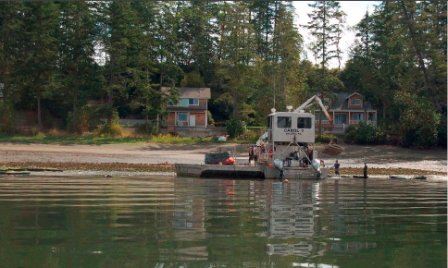[et_pb_text admin_label="Chris Fitzgerald byline; remember to tag post as various-contributors" saved_tabs="all" background_layout="light" text_orientation="left" header_font="Arimo||||" text_font="||on||" use_border_color="off" border_color="#ffffff" border_style="solid"]
At a packed Pierce County Council meeting on interim aquaculture regulations in Tacoma on Sept. 10, participants heard three new amendments to the ordinance, two of which were approved.
 This photo, showing a crane used for geoduck farming in North Mason County, was presented to Pierce County Council members during the Sept. 10 hearing. Photo courtesy Laura Hendricks
This photo, showing a crane used for geoduck farming in North Mason County, was presented to Pierce County Council members during the Sept. 10 hearing. Photo courtesy Laura Hendricks
One amendment removed the issue of dock length and joint-use docks from the combined docks/geoduck regulations, and passed unanimously.
A second proposal addressed bonding and circumstances of revocation of geoduck permits in the event of grower default.
Jim Gibbons, Seattle Shellfish owner, began his opposition testimony by stating, “One aspect of this I find amazing is that anyone can say anything while offering nothing in support of what they are claiming.” He accused the council of “choosing to ignore” legislative action establishing a process “to deal with the geoduck issue this last spring.”
Councilman Calvin Goings repeatedly asked Gibbons if he was going to address the amendment, and finally told him he would have to “speak to the amendment whether you like it or not.”
Richard Wooster, president of the newly formed Case Inlet Shoreline Association (Dutcher’s Cove) on the KP, urged passage of interim regulations. He said the organization’s mission is “ensuring the protection and preservation of the pristine Case Inlet through community stewardship, education, and scientific research.” He spoke in favor of the bond/revocation amendment so “bad actors can be effectively dealt with and their permits revoked.”
Diane Cooper of Taylor Shellfish said, “We do not approve of the amendments… Shellfish beds are critical saltwater habitat, and whether they are recreational or commercial, they should be protected. We recommend that this process be put on hold until…” At that point, Goings interrupted. “You are not speaking to the amendment,” he said, “so I’m going to ask you to take your seat please.” Councilman Dick Muri addressed the audience, saying, “People from the shellfish community are not doing themselves any favors by not speaking to the amendment.”
The third amendment, proposed by Muri, addressed expanded seeding and harvest of geoduck to include weekends when accessed only from the water.
Gibbons came back to the podium and said, “I think it’s a bad idea… I don’t see why somebody who owns property can’t allow somebody to cross their property and harvest shellfish on their property if they want to.”
Wooster spoke against weekend operations when waterfront owners are most likely to be enjoying their properties with family and friends. “That proposal should be rejected regardless if they (industry) are coming by sea or by land; the danger of weekend operations and the intrusion and impact upon the community is much greater.” Wooster also called for night seeding and harvesting to be “strictly limited.”
Laura Hendricks, president of Henderson Bay Shoreline Association, testified last on the issue. She distributed to the council a photo she said was taken two weeks before and held up a copy for the audience. “This is a great big crane on a boat that came from the water that would be able to be done on the weekends. It is tremendously disruptive. This is the kind of thing that is going to come into our neighborhoods and it’s outlandish.” She also distributed a photo of a Taylor Shellfish truck and other multiple vehicles on the beach, at water’s edge, or in the shallows at a site on Oakland Bay. Hendricks asked rhetorically why waterfront owners and beachgoers were urged to “walk softly,” when the same environmental care is not observed by the aquaculture industry.
After Hendricks left the podium, Muri said, “I guess even the industry doesn’t want this then; (this amendment) less restrictive to the shellfish community probably shouldn’t be passed. They testified against it, I guess we should all vote against my amendment. I’ll be voting no.”
Terry Lee stated he represented 179 miles of shoreline in his district, and it was “dangerous, destructive, and obtrusive to the people who want to exercise freedoms on the water to try and allow this type of commercial activity to occur when you most likely would be using that water frontage, and so I’ll be voting against the amendment and would encourage my colleagues to as well.” The amendment received a unanimous “no” vote.
This hearing was dissimilar from others on this topic; residents concerned about aquaculture from east of the Narrows were present and spoke passionately to the council about protection of shorelines throughout the county beyond the peninsula. This was also the first hearing in which two private lessees of Taylor Shellfish spoke favorably about their dealings with the company, followed by testimony to the contrary by neighbors.
Peter Downey, of Pacific Shellfish Institute, said, “The biggest threat to Puget Sound today is not aquaculture, it is upland development. By putting this regulation in place, what you are doing is encouraging waterfront urbanization and discouraging aquaculture that needs a clean and healthy environment.” The amended ordinance was passed with the addition of the two new amendments and will now go to the full council with a “do pass” recommendation.
UNDERWRITTEN BY THE FUND FOR NONPROFIT NEWS (NEWSMATCH) AT THE MIAMI FOUNDATION, THE ANGEL GUILD, ADVERTISERS, DONORS AND PEOPLE WHO SUPPORT INDEPENDENT, NONPROFIT LOCAL NEWS